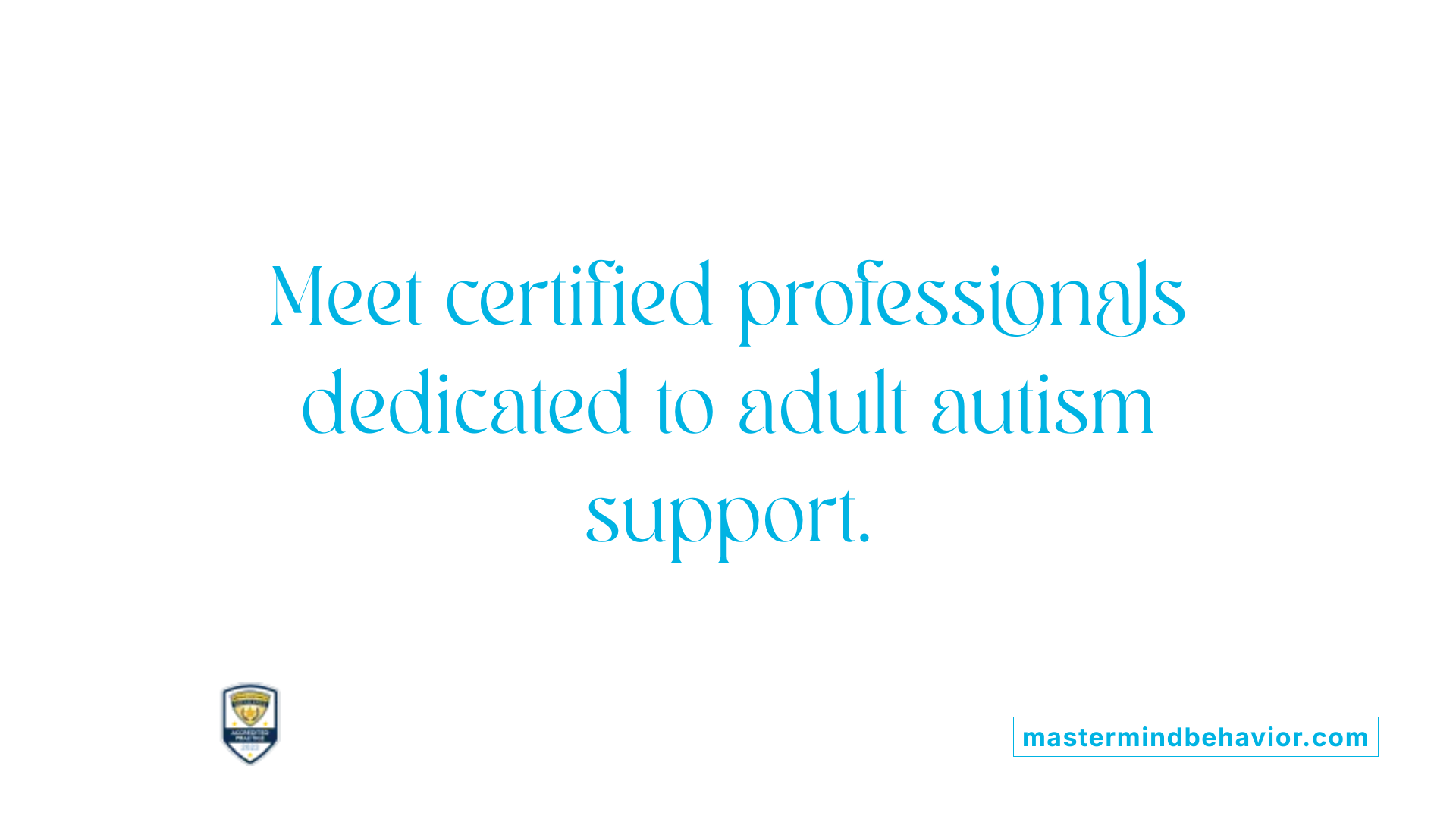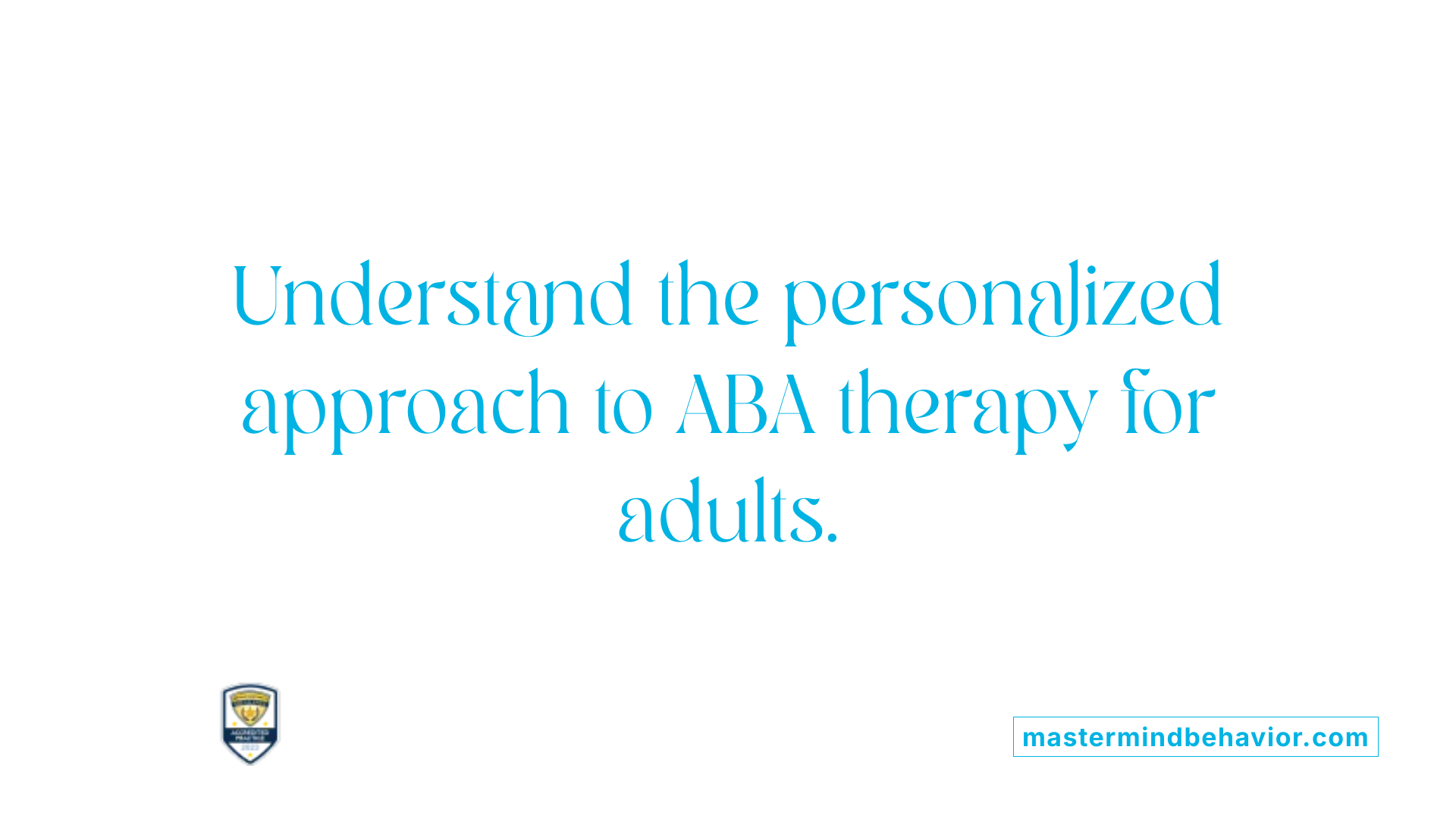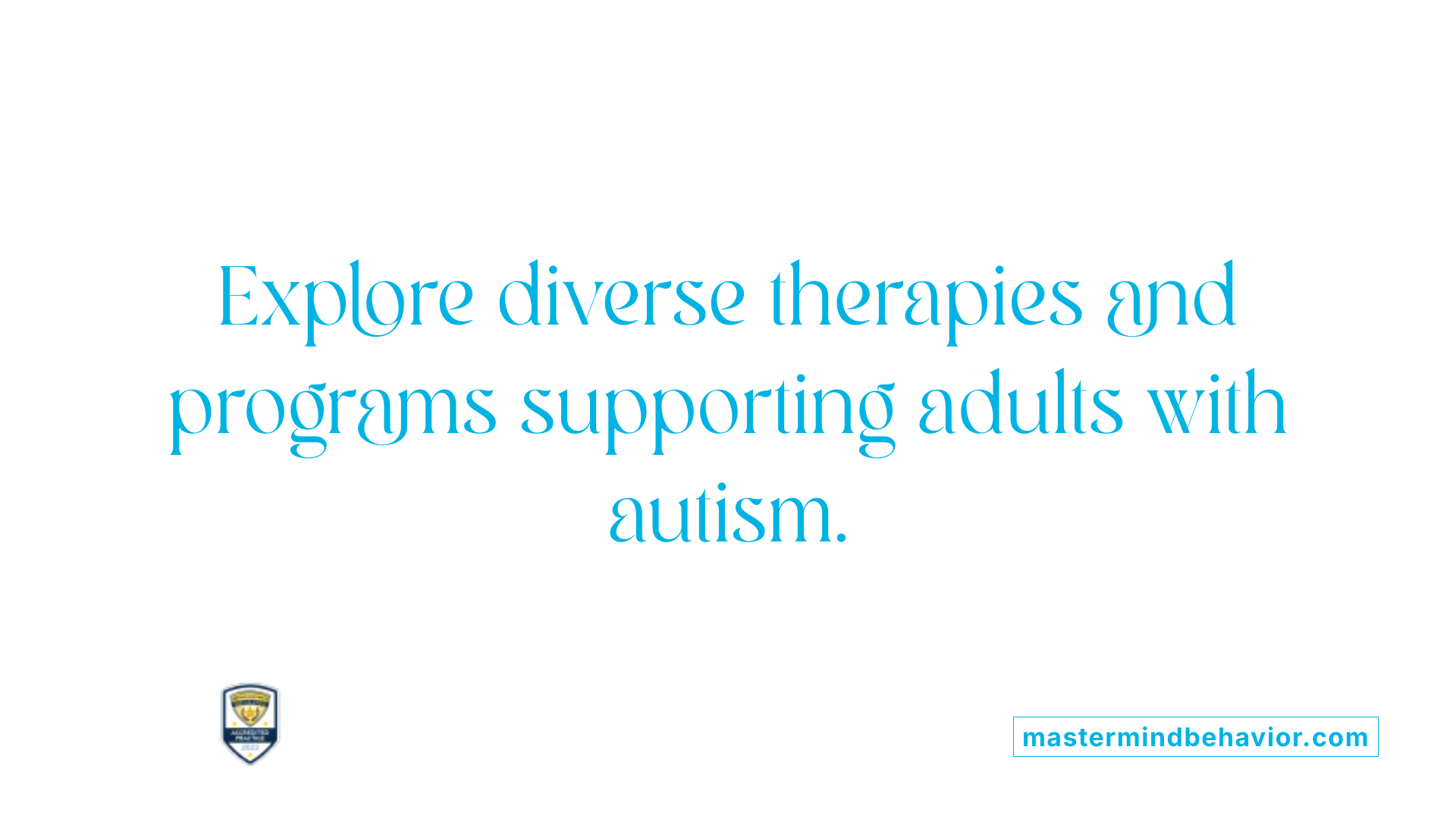Understanding How ABA Therapy Supports Adults on the Autism Spectrum
Applied Behavior Analysis (ABA) therapy is widely recognized as an evidence-based approach for supporting individuals with Autism Spectrum Disorder (ASD). While commonly associated with children, ABA services are equally vital for adults. Customized behavioral interventions help adults with autism improve essential life skills, foster independence, and enhance social and vocational functioning. This article explores how ABA and related services provide practical support options tailored specifically for adults with autism, alongside complementary therapies and community resources that strengthen quality of life.
What Is Applied Behavior Analysis (ABA) Therapy and Its Role for Adults with Autism?

What is applied behavior analysis (ABA) therapy, and how is it used to support individuals with autism?
Applied Behavior Analysis (ABA) therapy is a scientifically supported approach focused on understanding and improving behaviors through learning principles. ABA helps individuals with autism develop essential skills while reducing behaviors that may interfere with daily life.
ABA therapy works by breaking down skills into manageable steps and using techniques such as positive reinforcement—rewarding desired actions—to help increase those behaviors. It employs careful data collection to track progress and make informed adjustments to the treatment plan.
How is ABA applied in autism support?
ABA is widely used to teach a variety of skills including social communication, daily living routines, and vocational tasks. For adults with autism, ABA programs are tailored to foster independence by focusing on real-world functioning, such as managing in-home schedules, community participation, and job readiness.
What techniques are commonly used in ABA?
- Discrete Trial Training (DTT): Breaking down tasks into small steps and teaching them one at a time with clear instructions and reinforcement.
- Pivotal Response Treatment (PRT): Naturalistic, focusing on important skills like communication initiation in everyday environments.
- Role-playing and real-world practice: To strengthen social and functional skills.
In what settings is ABA therapy delivered?
ABA services can take place in various environments:
- Home-based: Personalized routines and skill coaching.
- Community: Volunteering, recreation, and social activities to promote engagement.
- Vocational programs: To develop job skills.
What are the goals of ABA for adults?
The primary goals are to improve independence, manage daily routines effectively, enhance social interactions, and reduce challenging behaviors. Through ABA, adults with autism gain practical life skills that contribute to improved quality of life and greater community participation.
ABA therapy is often provided by certified professionals and customized based on comprehensive assessments to ensure each adult's unique needs and preferences are met. This individualized approach helps maximize meaningful progress for adults living with autism.
Qualified Providers Delivering ABA Therapy to Adults with Autism

Who typically provides ABA therapy for individuals with autism?
ABA therapy for individuals with autism is primarily delivered by a multidisciplinary team of qualified professionals. This team usually includes Board Certified Behavior Analysts (BCBAs), who are responsible for designing and overseeing personalized treatment plans tailored to each adult's needs. Behavior therapists and technicians carry out the daily implementation of these plans, using structured strategies grounded in Applied Behavior Analysis principles.
Certification requirements
A crucial aspect of quality ABA therapy is the provider's credentials. BCBAs must complete specialized training and pass certification exams to demonstrate competence in behavior analysis. This certification ensures that therapy is evidence-based and meets professional standards. Providers working with adults typically have experience with adult populations, which is essential for addressing unique challenges related to independence, vocational skills, and social engagement.
Settings and delivery modes
ABA services for adults with autism are offered in various settings to promote generalization and convenience. These include in-home programs like Vista's Intensive In-Home and Community Services, community centers, clinics, and even telehealth platforms. Such flexibility allows customization of therapy environments to suit individual preferences and goals.
Caregiver involvement
Involving caregivers is an important component of effective ABA therapy. Providers often offer caregiver training and support to reinforce newly learned skills outside formal therapy sessions. This collaboration helps create a consistent approach across home and community settings, enhancing long-term outcomes for adults with autism.
Training and ongoing education
Providers engaged in ABA services undergo continuous professional development to stay current with emerging research and advancements. Organizations like the MyODP Training & Resource Center facilitate access to training on Functional Behavior Assessments and evidence-based interventions. This commitment to quality helps ensure that therapy remains effective and tailored to the evolving needs of adults living with autism.
How ABA Therapy is Structured and Delivered for Adults

Individualized Treatment Plans
ABA therapy for adults with autism begins with comprehensive assessments by behavior professionals to identify specific needs and goals. A Board Certified Behavior Analyst (BCBA) often leads the development of personalized treatment plans that focus on practical life skills, vocational training, and daily living tasks. These plans are tailored to each individual's preferences, interests, and cultural background, ensuring the approach aligns with their personal lifestyle and fosters independence.
Role of Behavior Analysts
Behavior analysts oversee the therapy delivery by designing behavior support plans based on Applied Behavior Analysis principles. They use systematic instruction methods and positive reinforcement to teach new skills. Through continuous monitoring and data analysis, they adjust interventions to maximize progress. Their expertise ensures that interventions effectively decrease challenging behaviors and increase functional skills.
Therapy Session Settings
Sessions are offered in various settings such as in-home, community environments, or clinical settings, depending on individual needs. Vista's Intensive In-Home and Community Services program, for example, provides full-day support allowing adults to engage in meaningful activities like volunteering or physical activities within their communities. This flexibility supports generalization of skills to real-world scenarios.
Use of Data and Positive Reinforcement
Data collection is integral during sessions to track behavioral frequencies, skill acquisition, and progress toward goals. Positive reinforcement strategies — including verbal praise, token economies, or preferred activities — are consistently used to motivate and encourage desirable behaviors. This data-driven approach allows for informed decision-making to refine treatment plans continually.
Family and Cultural Considerations
ABA therapy involves collaboration with family members and caregivers to incorporate culturally relevant practices and daily routines. This partnership enhances engagement and ensures consistency across settings. Tailoring interventions to respect cultural values and family dynamics helps improve outcomes and fosters a supportive therapeutic environment.
Benefits of ABA Therapy for Adults with Autism
What are the main benefits of ABA therapy for individuals on the autism spectrum?
ABA therapy for adults with autism offers considerable advantages in various areas vital to quality of life and independence.
Skill Development and Independence
ABA focuses on enhancing practical skills such as communication, daily living tasks, and vocational abilities. By breaking complex actions into manageable steps, adults learn and master essential routines that promote autonomy. This personalized teaching approach fosters self-sufficiency in in-home activities and community involvement.
Behavioral Improvements
Using positive reinforcement and data-driven strategies, ABA reduces challenging behaviors while increasing adaptive and socially appropriate actions. Individualized behavior support plans guide interventions, allowing measurable progress and adjustment of strategies over time.
Social and Vocational Gains
ABA therapy supports social skills development and community engagement, helping adults with autism navigate interpersonal interactions and workplace environments. Activities like volunteering and real-world practice through role-playing enhance communication and social competence.
Customized and Evidence-Based Nature
Each ABA program is tailored based on comprehensive skill assessments and collaborative goal setting. The use of empirically-supported techniques—including discrete trial training and pivotal response training—ensures that interventions are effective and relevant to personal interests and needs.
Long-Term Outcomes
Adults undergoing ABA therapy often experience improved management of daily routines, increased independence, and better integration into community and vocational settings. These gains contribute to sustained quality of life improvements and support lifelong learning.
| Benefit Area | Description | Impact on Adults with Autism |
|---|---|---|
| Skill Development | Focus on practical, daily living and vocational skills | Promotes independence and self-care |
| Behavioral Improvements | Reduction of challenging behaviors using positive reinforcement | Enhances social appropriateness and adaptability |
| Social/Vocational Gains | Training in social interactions and community engagement | Improves communication and job readiness |
| Customization | Personalized programs based on assessments and goals | Ensures therapy relevance and effectiveness |
| Long-Term Outcomes | Sustained improvements in daily routines and social participation | Supports independence and quality of life |
Specialized ABA Services and Community Integration for Adults with Autism

What are Intensive In-Home and Community Services Programs?
Vista's Intensive In-Home and Community Services program offers highly specialized ABA-driven direct care tailored for adults living with autism in South Central Pennsylvania. This program is designed to serve adults requiring more support than typical day programs, providing full-day services that help address complex needs through a team of behavior professionals trained in ABA therapy.
How Are Daily Living Activities Personalized?
The program personalizes activities by incorporating each individual’s preferences, interests, and goals. This individualized approach helps foster independence and develops critical life skills. Support includes arranging in-home routines and teaching practical skills through positive reinforcement and data-driven strategies.
What Does Community Engagement and Vocational Training Include?
Adults in the program participate in community engagement such as volunteering opportunities and physical activities. There are clear objectives to prepare individuals for eligibility in community-based programs. Vocational training is integrated into therapy, focusing on daily living skills and social interaction, using techniques like role-playing and real-world practice to ensure practical outcomes.
How Does the Program Support Transportation and Partnerships?
Vista facilitates transportation services and maintains active partnerships with local organizations. These efforts ensure that community engagement is accessible and tailored to meet the unique needs of adults with autism, thereby expanding opportunities for participation beyond the home environment.
What Role Do Local and State Autism Resources Play?
This program aligns with resources such as the Adult Community Autism Program (ACAP) and supports offered by the Department of Human Services (DHS) in Pennsylvania. It is enhanced by partnerships with groups like the Autism Services, Education, Resources and Training Collaborative (ASERT), which provide valuable training and supports. These local and state organizations help reinforce the continuum of care and resources available to adults with autism, promoting quality of life and independence.
| Aspect | Description | Additional Details |
|---|---|---|
| Intensive Care | Full-day ABA-driven care tailored for adults with higher support needs | Behavior professionals use positive reinforcement |
| Personalized Activities | Customized daily routines and preferences | Focus on independence and life skills |
| Community Engagement | Volunteering, physical activities, and vocational prep | Prepares for community program eligibility |
| Transportation & Partnerships | Provides mobility support and local collaborations | Enhances community access and inclusion |
| Local & State Resources | Leveraging programs like ACAP, DHS, and ASERT | Supports comprehensive care and training |
Complementary Treatment Options and Resources Supporting Adults with Autism

Other therapies alongside ABA
Adults with autism benefit from a range of therapies complementing Applied Behavior Analysis (ABA). Cognitive-Behavioral Therapy (CBT) helps manage symptoms by addressing unhealthy thought and behavior patterns, focusing particularly on current issues like anxiety and depression. Social Skills Training (SST) enhances communication and social interaction abilities through role playing, modeling, and other techniques tailored to adults, especially those diagnosed later in life.
Psychological and social skills training
Psychological approaches such as CBT address mental health challenges commonly co-occurring with autism, including anxiety and depression. Social skills training fosters abilities needed for everyday interpersonal interactions, contributing to improved relationships and community involvement.
Government programs and waivers
In Pennsylvania, several government-supported programs provide vital support services. The Adult Autism Waiver (AAW) and the Adult Community Autism Program (ACAP) offer resources designed to enhance quality of life and increase independence for adults with autism. These programs often cover therapies and community engagement services, ensuring structured support.
Training and resource centers
Resources like the Autism Services, Education, Resources and Training Collaborative (ASERT) and the MyODP Training & Resource Center deliver training and educational materials. These centers assist professionals and families in accessing best practices, including support for ABA therapy and functional behavior assessments.
Insurance and accessibility considerations
The Pennsylvania Autism Insurance Act (Act 62) mandates insurance coverage for autism-related behavioral services, improving access to therapies like ABA. Organizations such as Positive Behavior Supports Corporation (PBS) accept various insurance plans, helping individuals secure individualized ABA therapy. Verification of provider credentials and experience remains critical for choosing effective and personalized care.
This comprehensive array of complementary therapies, governmental programs, training resources, and insurance support plays a pivotal role in meeting the diverse needs of adults living with autism.
Expanding Support and Improving Lives Through ABA and Related Autism Services
ABA therapy remains a cornerstone in helping adults with autism gain independence, develop vital skills, and lead fulfilling lives. When combined with complementary interventions and supported by community resources, adults on the spectrum benefit from personalized, holistic care tailored to their unique needs. Qualified providers, comprehensive programs, and accessible services contribute to meaningful progress and improved quality of life. Ongoing collaboration between professionals, families, and individuals ensures that support evolves as needs change, creating a more inclusive future for adults with autism.
References
- Intensive In-Home & Community Services
- ABA Therapy for Adults: Benefits and What to Expect
- Therapy for Adults With Autism
- Autism Services | Department of Human Services
- Treatment and Intervention for Autism Spectrum Disorder
- Behavior Therapy Services for Adults with Autism
- ABA Therapy | Applied Behavior Analysis | PBS Corporation










